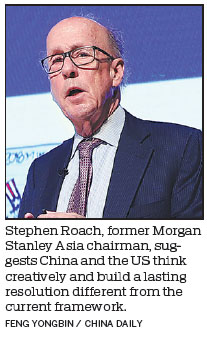Economist details structural issues behind bilateral trade imbalance
China and the United States need a fresh approach to get their economic relationship back on track, a leading US economist with expertise on China said on Tuesday.
The two countries need to be "much more creative" and think of a different way to negotiate, economist Stephen Roach, a former Morgan Stanley Asia chairman, said at a Vision China event hosted by China Daily and Bank of China at the Asia Society in New York.

Roach now serves as senior fellow at Yale University's Jackson Institute for Global Affairs and is a senior lecturer at the Yale School of Management.
Another round of negotiations between the countries' top negotiators is scheduled for early October. They will be the first high-level talks after new tariffs were recently imposed by both sides.
In previous, intermittent sessions over the 400-plus days of the US-China trade dispute, Chinese and US negotiators have built a structure for a potential trade deal focusing on trade imbalances, structural changes in China, and a framework for implementation.
Roach said he believed the framework fell short of a lasting resolution.
Instead of blaming China for the $419 billion US-China trade deficit, Roach said, it should be attributed to internal, macroeconomic factors in the US, notably the low domestic savings rate. Roach argued that the savings rate - 2.4 percent of GDP last year, according to the US Bureau of Economic Analysis - could help explain why the US had bilateral deficits with 102 countries totaling $621 billion last year.
The shortfall in savings "is our fault, in large part, because of budget deficits", he said. "We don't want to admit that - it's easier for us to blame it on China."
The US side's case against structural issues in the Chinese economy - forced technology transfer, cybersecurity, intellectual property rights and state-sponsored industrial policy - lacked solid evidence, Roach said.
The Section 301 report conducted by the United States Trade Representative that highlighted those issues was based on "circumstantial evidence at best", he said, and thus did not make a "compellingly strong case".
Roach said he did not expect a "hot war", but could not rule out the possibility of a new cold war. He said the US has less economic strength today in terms of GDP growth, savings rates and productivity growth.
He suggested the two countries build a lasting resolution that is different from the current framework.
That includes improving market access for companies from each country through bilateral investment treaties, each making macroeconomic adjustments to address the savings issue, developing a more sustainable dialogue system, and collaborating on global cybersecurity issues.
"We can do better; we must do better," Roach said.
nancykong@chinadailyusa.com
(China Daily Global 09/19/2019 page8)


















